January, 2024 Eye on Research
Commentary
Making Progress on Terminology
We previously discussed terminology in higher education and how new terms are needed for some things and/or processes. To this end, we have started to use the term learner internally at AACRAO. This is an intentional shift away from the term student. As we start to engage more in the concept of learning mobility, the term student is too narrow. Below are definitions from the Oxford Language Dictionary. As you can see, the term learner is more inclusive.
“Student: a person who is studying at a school or college.”
“Learner: a person who is learning a subject or skill.”
We use the term “learner” in the upcoming AACRAO publication Academic Operations: The Role of the Registrar, to be released in time for the 2024 AACRAO Annual Meeting1.
In September I also addressed the terms digital credential, alternative credentials and similar terms, and how AACRAO is working to identify a term the higher-education community will embrace. Included in the research updates, below, is a new report Credential Confusion that further highlights why higher education needs to agree on one term. For the Academic Operations book, we agreed on the term incremental credential, defined below, and hope this term resonates with the higher-education community.
Incremental credential: An earned skill or achievement that can stand alone, or be combined (stacked) with other credentials, to be applied to a higher-level credential, such as a certificate or degree2.
AACRAO Research Update
New AACRAO Research Advisory Board Member

 Please welcome Dr. Darcy Briggs, Associate Vice President of Academic Affairs at the South Dakota School of Mines. Her professional background and interests align perfectly with the goals of the AACRAO advisory board. Darcy spoke with our communications team to share a bit about herself and why she decided to apply for the position on the research advisory board.
Please welcome Dr. Darcy Briggs, Associate Vice President of Academic Affairs at the South Dakota School of Mines. Her professional background and interests align perfectly with the goals of the AACRAO advisory board. Darcy spoke with our communications team to share a bit about herself and why she decided to apply for the position on the research advisory board.

2023 Chief Enrollment Management Officer Career Profile Report
This report examines the various roles of a Chief Enrollment Management Officer (CEMO) in the United States, based on experiences shared by 205 current CEMOs. It marks the fourth edition of AACRAO's Chief Admissions Officer career-profile survey, following its predecessors in 2014, 2017 and 2020. These reports are part of a series that focuses on key roles in academia: Chief Enrollment Management Officers (CEMOs), Chief Admissions Officers (CAdOs) and Registrars. Two main objectives of these reports are to:

Credential Confusion–A New AACRAO Report
AACRAO completed a survey in June 2023 to explore how terminology related to innovative credentials is understood and used in different educational settings. The survey focused on understanding various interpretations and uses of six key terms within the sphere of innovative credentials: Comprehensive Learner Record (CLR), Learning and Employment Record (LER), Badges, Microcredential, Alternative Credentials and Digital-Credential Wallet.
The findings determined the language we use when discussing innovative credentials is fluid and subject to diverse interpretations, based on the institutional context.
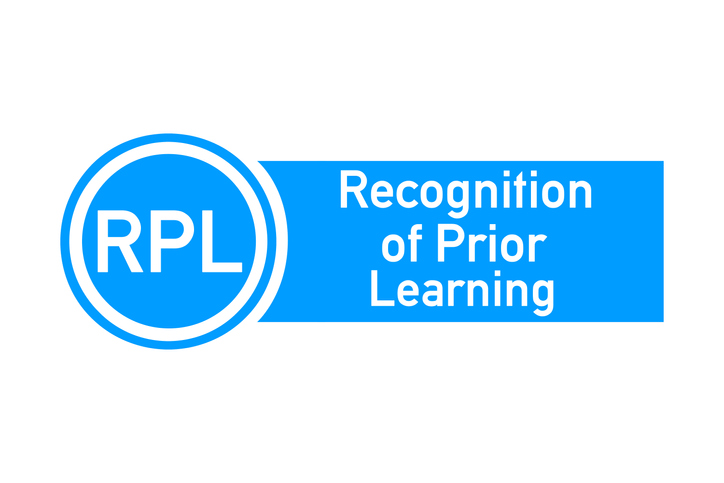
In mid February we will invite all AACRAO primary contacts to complete a survey on recognition of prior-learning practices at their institution. This benchmark will serve three purposes–to update previous benchmarking data, to inform a chapter in the forthcoming Learning Mobility book, and to provide data for a session at the annual conference. You will notice below that the University of Montreal is conducting a similar survey right now and is seeking participants. The two surveys will compliment each other and will both contribute to our understanding of the current state of the recognition of prior learning.
Research Participation Opportunities
We have three calls for participation in research this month. The details are included below.
Dissertation Assistance Sought - Research on the Willingness of Staff to Accept Technology
One of our members, Rita Wilson, Associate Registrar at Park University, is seeking participants to complete her survey on whether staff at colleges and universities embrace technology and, if so, how that technology is used. Participation is voluntary and anonymous. Please use this link to an AACRAO Connect Article if you would like to learn more about the research and to complete the survey.
International Transcript Receipt and Evaluation Practices Survey
The Working Group on Digital Delivery of Credential Evaluations (DDCE) is conducting a survey to benchmark the current state of how institutions receive international-transcript and international-credential-evaluation reports. Traditionally, these reports have been mailed, but with technological advancements, digital delivery is becoming more common. Data collected will be used to form the basis of recommendations for future practice. The audience is personnel familiar with these processes at U.S. and Canadian institutions of higher education. The survey will be open until February 29, 2024. Please use this link if you wish to participate.
Please contact Julia Funaki if you have any questions about the DDCE survey.
University of Montreal Prior Learning Assessment & Recognition (PLAR) Practices Survey
The Registrar’s Office of the Université de Montréal is surveying to benchmark the current state of the institutional framework for Prior Learning Assessment and Recognition. The PLAR processes can be undertaken for several purposes, including self-knowledge, credit or advanced standing at an academic institution, for employment, licensure, career planning or recruitment.
Data collected will be used to form the basis of recommendations for optimize and improve the PLAR process at the Université de Montréal. The audience is personnel familiar with these processes at U.S. and Canadian institutions of higher education. The survey will be open until February 16, 2024. Please use this link if you wish to participate:
Please contact Viktoriia Lastovets if you have any questions about the University of Montreal Survey.
Current Higher-Education Research and Related Topics
Employer Survey Report Presents Findings on Views and Perceptions of Higher Education
The findings of the employer survey focus on employer perceptions related to higher education and less explicit personal qualities an employer looks for when hiring. The report identifies a number of key takeaways for institutions of higher learning and employers.
Figure 1: Key Takeaways
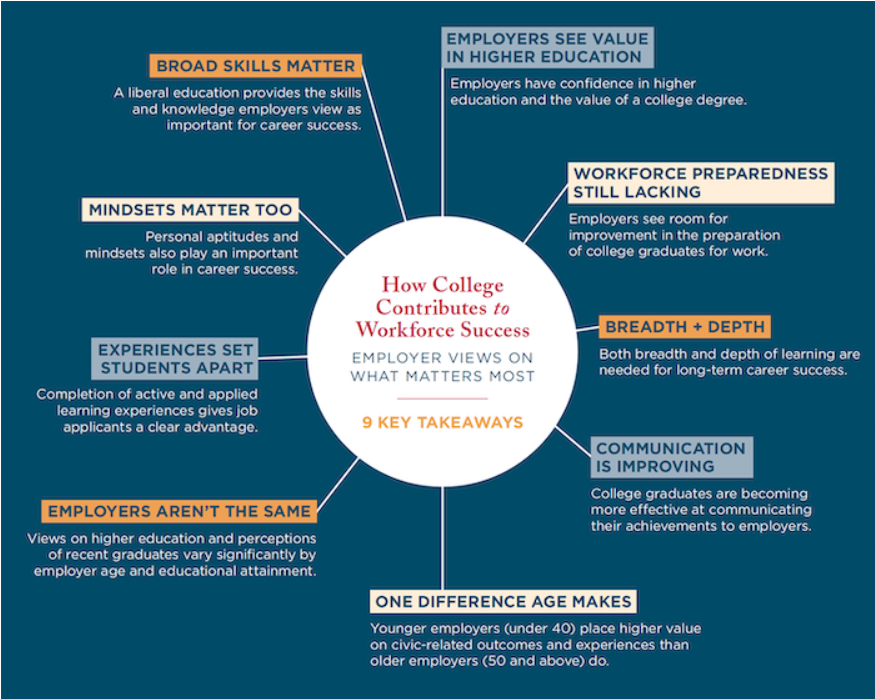
Source: AAC&U. “How College Contributes to Workforce Success: Employer Views on What Matters Most,” December 7, 2023. https://www.aacu.org/research/how-college-contributes-to-workforce-success
New Report Identifies Common Post-Graduation Barriers to Career Success
The report from WGU Labs examines the transition from graduation to the workforce. Several barriers were identified, including:
-
employers need help in to communicate the skills needed for success in a position
-
educational institutions struggle to articulate the skills their programs of study provide
-
the majority of learners do not access career-center resources to support their transition to a career
-
the current model for hiring largely ignores the role of the workplace in supporting new graduates in their careers
The report also proposes solutions for the gap between higher education and the workplace.
Case Study Describes Using Predictive Analytics and Care Management to Promote Learner Success
A new case study from the University of South Florida (sign-up required) documents the use of early predictive models in tracking student outcomes, in a case-management-model approach. The study goal was to break down divisions between institutional research, information technology, student affairs and academic affairs. Key results in the 2019/2020 academic year include:
-
first-year retention rates improved from 86% to 91.9%
-
4- and 6-year graduation rates improved to 63.5 percent and 74.6 percent, respectively
-
15 to 25% of learners are in the greatest need of outreach
Figure 2.
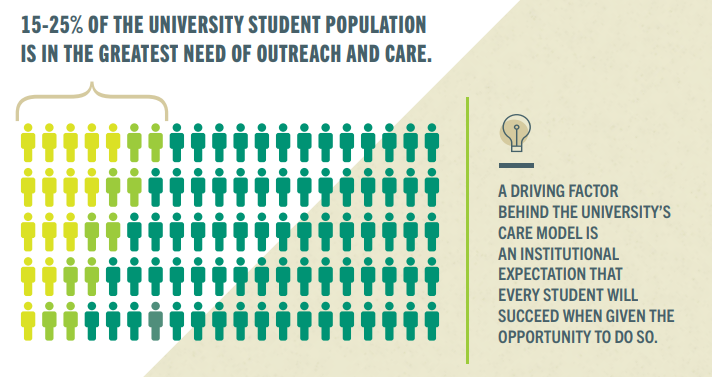
Source: “Humanizing Data for Student Success,” n.d. https://perspectives.usf.edu/humanizing-data?
Survey of Gen-Z Learners Examines Their Priorities for Work and Education
A survey report on Gen-Z teenagers examines their beliefs and attitudes about working and education. Data indicates a considerable rise in the proportion of Gen-Z teenagers who believe postsecondary education is essential. However, half of this group believes 2 or 3 years of post-high-school education is ideal, and there are other ways they may succeed. This is an extensive report with many infographics. Other key points include:
-
about 75% of respondents report feeling pressure to seek a 4-year degree
-
63% of respondents are are open to options other than a 4-year degree
-
13% believe they are ready to decide on their post-high-school career
-
a career is the ultimate goal; postsecondary education is considered as a means to reach that goal
-
current high-school learners believe practical experience and on-the-job training are crucial for future academic success
Figure 3.
 Source: https://www.questionthequo.org. ?“Question the Quo,” June 2023. https://www.questionthequo.org/media/oj5p3gaz/question-the-quo-june-2023-report.pdf
Source: https://www.questionthequo.org. ?“Question the Quo,” June 2023. https://www.questionthequo.org/media/oj5p3gaz/question-the-quo-june-2023-report.pdf
New Report Finds Little Improvement in Gender-Based Pay Gaps in Higher Education
The report from the College and University Professional Association for Human Resources (CUPA-HR) found female leaders in colleges and universities do not receive equal pay to men in similar roles. Figure 4. Key points include:
-
in 2022, women in college administration earned $0.93 for every dollar paid to men
-
the pay difference between White men and administrators of Color narrowed between 2012 and 2022
-
Native American and Alaska Native women earn the least making $0.83 compared to $1.00 paid to white men in similar roles
-
disparities in hiring are largely unchanged; people of Color hold 18% of administrator roles, as compared to 13% in 2012
Figure 4
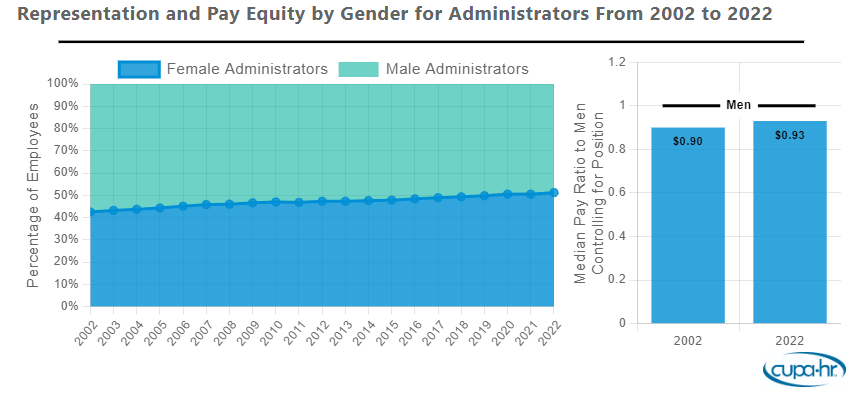
Source: CUPA-HR. “Higher Ed Administrators: Trends in Diversity and Pay Equity From 2002 to 2022,” n.d. https://www.cupahr.org/surveys/research-briefs/higher-ed-administrators-trends-in-diversity-pay-equity-november-2023/
New Study Examines Barriers Working Mothers Face in Careers and Higher Education
The Mothers Overcome More (M.O.M.)TM report from the University of Phoenix thoroughly examines the obstacles American women face daily and the effects these obstacles have on possibilities for job growth and advancement. Figure 5. The study provides insight into how one might remove some of those obstacles and establish procedures and support networks to provide women new career and educational opportunities. This extensive report contains many interesting, impactful infographics.
Figure 5
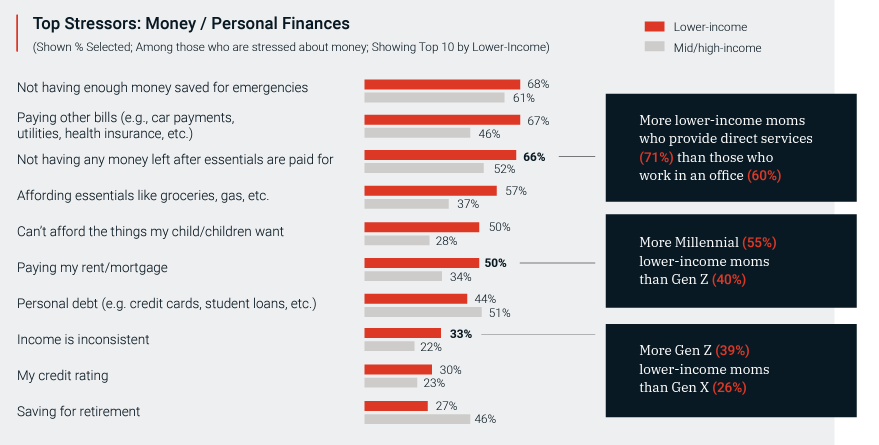
Source: University of Phoenix. “Mothers Overcome More - University of Phoenix Career Institute,” n.d. https://www.phoenix.edu/career-institute/mothers-overcome-more.html?
Study Examines Models for Alternative Credentials Used by Institutions
A new study from UPCEA shows that although alternative credentials have been widely adopted by institutions, they are not always part of an institution's strategic priorities. Figure 6. The majority of respondents were from larger public research institutions, with little response from 2-year institutions. Key points include:
-
69% of respondents strongly agree or agree “senior leadership at their institution has embraced alternative credentials”
-
Noncredit credentials at institutions surveyed broke down as shown below:
-
56% of professional certificates are offered as both noncredit and credit certificates
Figure 6: Importance of Alternative Credentials

Source: Nelson, Molly. “New Research: UPCEA Reveals Key Findings on Alternative Credentials.” EIN Presswire, January 8, 2024. https://www.einpresswire.com/article/679320356/new-research-upcea-reveals-key-findings-on-alternative-credentials.
New Survey Investigates How A.I. Affects Learner Career Pathways
A flash survey by Inside Higher Ed of 1,250 college learners provides insight on learners’ perceptions of how AI impacts future careers and how colleges can better prepare the learner. Figure 7. Key takeaways from the survey include:
-
the rise of A.I. affects what learners plan to study; 14% say A.I. has influenced their decisions a great deal, and 34% say it has influenced them somewhat
-
A.I. has impacted learners’ career plans and appears to be on the rise; 61% of the class of 2027 say A.I. has affected their career plans, compared to 31% of the class of 2024
-
72% of learners believe their college should be preparing them for A.I. in the workplace
-
60% of learners prioritize learning the practical application of A.I.; 72% want training on the ethics of using A.I.
Figure 7.
 Source: Flaherty, Colleen. “Survey: College Students’ Thoughts on AI and Careers.” Inside Higher Ed | Higher Education News, Events and Jobs, January 10, 2024. https://www.insidehighered.com/news/student-success/life-after-college/2024/01/10/survey-college-students-thoughts-ai-and-careers?
Source: Flaherty, Colleen. “Survey: College Students’ Thoughts on AI and Careers.” Inside Higher Ed | Higher Education News, Events and Jobs, January 10, 2024. https://www.insidehighered.com/news/student-success/life-after-college/2024/01/10/survey-college-students-thoughts-ai-and-careers?
Survey of 1,000 Graduate-Program Learners as to the Value of a Graduate Degree
A survey published in USA Today examines whether graduate school is worth the cost. The study, conducted by the centrist think tank Third Way, reveals there are many surprises involved in applying to, funding and completing graduate school. Poll results expose significant gaps in the information graduate learners rely on when deciding on a degree program. Key points include:
-
about half of graduate learners use loans to pay for their degree; their debt levels tend to be higher
-
only 50% of participants said they felt certain the advanced schooling was “worth it”
-
a majority of respondents state they will need more time than they had expected to pay off their student debt
-
while most participants said their graduate studies met or exceeded expectations, 25% were unhappy with their program’s overall worth
-
employment postgraduation strongly affects perceptions
-
of those employed full time, 56% said their education was "definitely" worth it; 32% of those unemployed or only partially employed said the same
New Brief on Rural College Completion and Challenges
A new brief from the Institute for College Access and Success examines obstacles faced by rural colleges and learners, and makes suggestions on how to overcome them. The brief highlights the need for research and policy conversations in these areas. Key points include:
-
rural communities in America have lower college enrollment and completion rates despite high graduation rates
-
The share of rural residents who identify as people of color increased by four percentage points to 25% between 2010 and 2020
-
rural areas experience higher poverty rates and lower household incomes; the median income for rural households was $11,000 lower than the national average
-
in 2020/2021, the proportion of first-time learners receiving financial aid in rural areas was over 6 percentage points higher than in urban areas
Examination of Support for Prospective Learners
To better understand adult-learner inquiry experiences, UPCEA and InsideTrack recently conducted a study in which they examined Request For Information (RFI) forms, online-program-management providers and hidden shoppers. The purpose of the study was to find out how many people switch from being prospective to enrolled learners, how long it takes to respond to student requests and if RFI forms are customized to meet the goals of the school or the needs of prospective learners. Enrollment challenges and guidance on improving enrollment processes were also examined.
Figure 8

Source: “Looking Toward the Future: Enrollment Strategies and Evolving Expectations of Potential Inquirers,” January 18, 2024. https://www.insidetrack.org/reports/enrollment-strategies-and-evolving-expectations-of-potential-inquirers